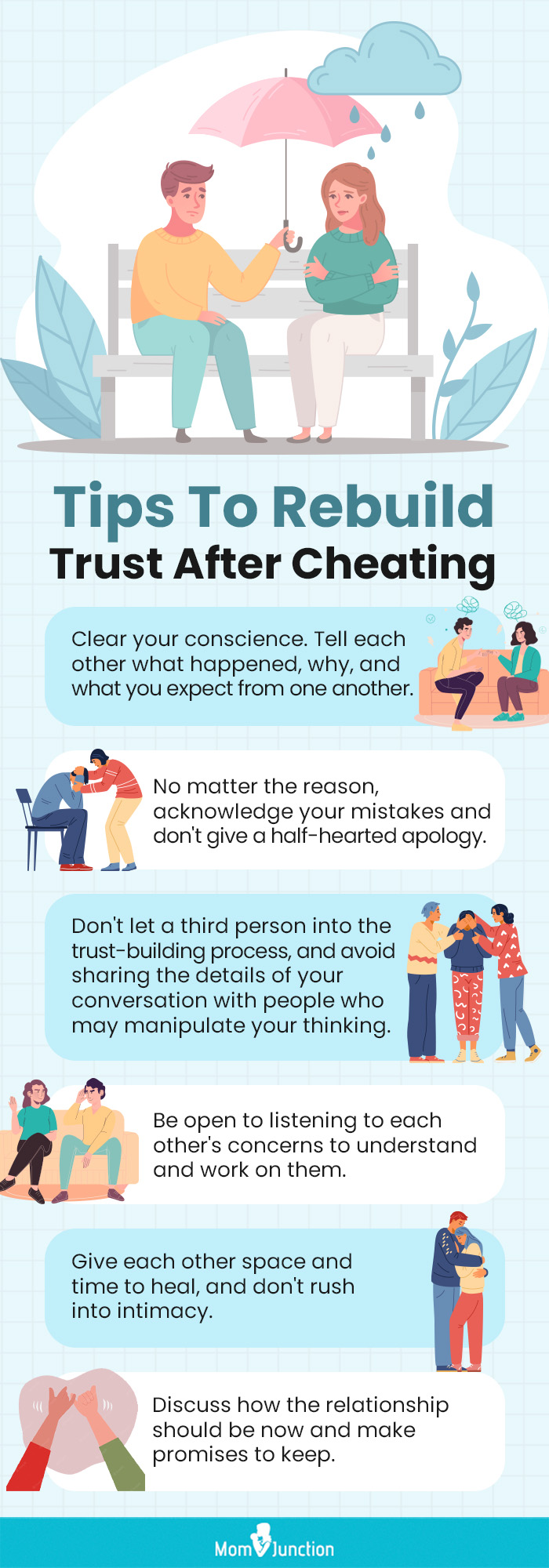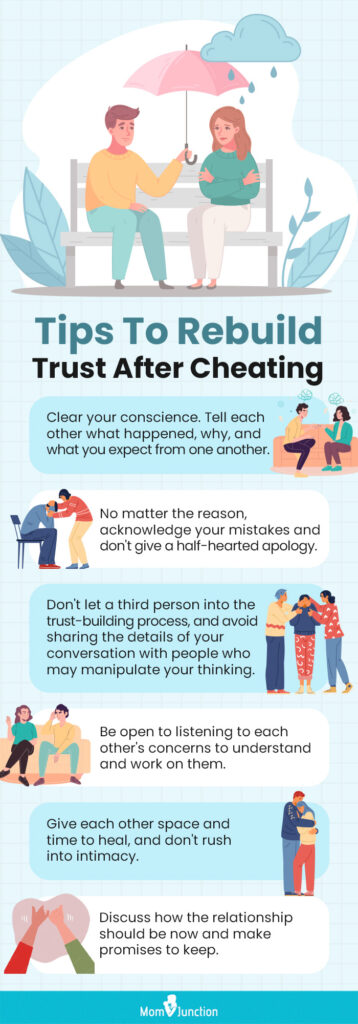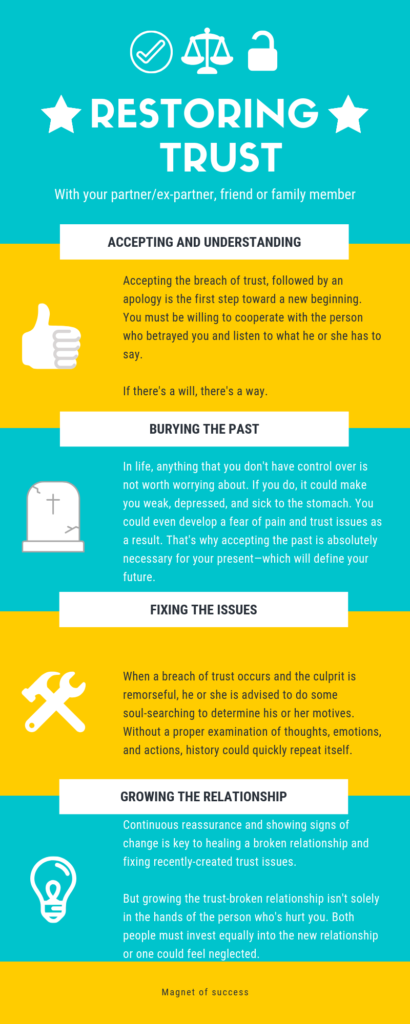
Imagine you are in a situation where your partner has shattered your trust, leaving you feeling lost and unsure of what to do next. It’s a painful experience that many of us have gone through. But fear not, for there is hope. Our product, “How Can I Trust My Partner Again After They Broke My Trust?” is designed to guide you through the process of rebuilding trust, helping you heal and fostering a stronger connection with your partner. In this article, we will explore practical strategies and insightful tips to help you navigate this challenging journey and find the path to trust once again.

This image is property of www.verywellmind.com.
1. Acknowledge your feelings
Recognize your emotions
When your partner has betrayed your trust, it is important to acknowledge the emotions you are experiencing. You may feel a wide range of emotions such as anger, sadness, confusion, and disappointment. By recognizing and accepting these emotions, you can start the journey towards healing and rebuilding trust.
Allow yourself to grieve
Betrayal can be a significant loss, and it is important to give yourself permission to grieve. Allow yourself to feel the pain and sadness that comes with the betrayal. Give yourself the space and time to process your emotions and come to terms with what has happened.
Accept the pain
Accepting the pain may seem difficult, but it is a crucial step in moving forward. It is normal to feel hurt and betrayed when someone we trust breaks that trust. By accepting the pain, you can begin to find ways to heal and rebuild trust in your relationship.
2. Understand the context
Uncover the reasons behind the betrayal
Understanding the reasons behind the betrayal can help provide clarity and insight into the situation. It is important to have an open and honest conversation with your partner to gain a deeper understanding of their actions. This can be a challenging process, but it is crucial for rebuilding trust and moving forward in the relationship.
Consider the circumstances
When trying to rebuild trust, it is important to consider the circumstances surrounding the betrayal. Was it a one-time mistake or a pattern of behavior? Were there any underlying issues in the relationship that may have contributed to the betrayal? Understanding the context can help provide a more comprehensive understanding of the situation and guide your path towards rebuilding trust.
Evaluate the impact on your relationship
The betrayal may have had a profound impact on your relationship. Take the time to evaluate the extent of the damage caused and how it has affected your trust in your partner. This evaluation will help you determine if rebuilding trust is possible and if the relationship can move forward in a healthy and positive way.
3. Communicate openly
Express your feelings and concerns
Open and honest communication is essential when trying to rebuild trust. Express your feelings and concerns to your partner in a calm and non-confrontational manner. Clearly articulate how their betrayal has affected you and what you need from them moving forward. By expressing yourself openly, you create a foundation for understanding and healing.
Listen to your partner’s perspective
In addition to expressing yourself, it is equally important to listen to your partner’s perspective. Give them the opportunity to explain their actions and their feelings. Try to understand their motivations and gain insight into their thought process. By truly listening, you can foster empathy and understanding in your relationship.
Encourage honest and transparent conversations
Rebuilding trust requires open and transparent communication. Encourage your partner to be honest and upfront about their thoughts and feelings. Foster an environment where both of you can freely express yourselves without judgment. By promoting honesty and transparency, you can start to rebuild trust and create a stronger foundation in your relationship.
4. Seek professional help
Consult a couples therapist
Rebuilding trust can be a complex and challenging process, and seeking professional help can be incredibly beneficial. Consider consulting a couples therapist who specializes in trust-related issues. They can provide guidance, support, and tools to help you navigate the road to rebuilding trust.
Find a trusted counselor
In addition to couples therapy, finding a trusted counselor to work individually with can also be beneficial. A counselor can help you process your emotions, explore any underlying issues, and guide you towards healing and growth. They can provide a safe space for you to express yourself and gain a deeper understanding of yourself and your relationship.
Explore relationship workshops or retreats
Another option to consider is attending relationship workshops or retreats. These programs often offer a structured environment where couples can learn new communication skills, deepen their emotional connection, and work on rebuilding trust. Such workshops can provide valuable resources and tools to aid in the healing process.

This image is property of www.momjunction.com.
5. Set boundaries and expectations
Establish clear guidelines
When working towards rebuilding trust, it is important to establish clear guidelines moving forward. These guidelines may include specific actions or behaviors that are unacceptable, as well as expectations for openness, communication, and accountability. By establishing clear boundaries, you create a framework for rebuilding trust and preventing future betrayals.
Agree on acceptable behavior
In addition to boundaries, it is crucial to agree on acceptable behavior. Discuss with your partner what actions are necessary to rebuild trust and maintain a healthy relationship. Agree on what constitutes trustworthy behavior and ensure that both of you are committed to upholding these standards.
Communicate your needs
Clearly communicate your needs to your partner. Let them know what you require for the healing process and what actions or behaviors will help rebuild your trust. By openly expressing your needs, you empower yourself and set the stage for effective communication and growth in the relationship.
6. Give time for healing
Allow yourself to process the pain
Healing takes time, and it is important to allow yourself the space and time to process the pain caused by the betrayal. Give yourself permission to grieve and work through your emotions. Engage in activities that bring you comfort and dedicate time to self-care and self-reflection.
Take the necessary time to rebuild trust
Just as healing takes time, so does rebuilding trust. Understand that it is a gradual process and that it cannot be rushed. Be patient with yourself and your partner as you navigate this journey. Give yourself and your partner the necessary time and space to rebuild trust organically.
Practice self-care and self-reflection
While working on rebuilding trust, it is important to prioritize self-care and self-reflection. Take care of your physical, emotional, and mental well-being. Engage in activities that bring you joy and peace. Additionally, spend time reflecting on your own actions and emotions to ensure that you are actively working towards personal growth and healing.

This image is property of magnetofsuccess.com.
7. Monitor and evaluate actions
Observe your partner’s behavior
As you work towards rebuilding trust, it is crucial to observe your partner’s behavior. Look for consistent efforts on their part to regain your trust. Pay attention to their actions, words, and overall commitment to change. Rebuilding trust requires both parties to actively participate and demonstrate their commitment to rebuilding the relationship.
Look for consistent efforts to rebuild trust
Rebuilding trust is not a one-time action but an ongoing process. Look for consistent efforts from your partner to rebuild trust. This may include being accountable for their actions, honoring the established boundaries, and actively engaging in open and honest communication. Consistency is key in rebuilding trust and fostering a healthy relationship.
Assess their commitment to change
Evaluate your partner’s commitment to change. Are they actively working on themselves and the relationship? Are they seeking help and implementing new strategies to rebuild trust? Assess their level of commitment and determine if it aligns with your expectations and needs. Rebuilding trust requires mutual effort and dedication.
8. Stay patient and realistic
Recognize that rebuilding trust takes time
Rebuilding trust is a process that takes time, and it is important to recognize and accept this reality. Be patient with yourself and your partner as you navigate this journey. Avoid placing unrealistic expectations on the timeline for rebuilding trust and understand that it may require significant effort and patience.
Be realistic about setbacks and progress
In the process of rebuilding trust, setbacks are bound to happen. It is important to be realistic about these setbacks and not allow them to discourage you. Understand that setbacks are a natural part of the healing process and take them as opportunities to learn and grow. Similarly, celebrate the progress you and your partner make along the way, no matter how small.
Practice patience and understanding
Patience and understanding are key when rebuilding trust. Accept that the healing process may have its ups and downs and that it may take time for both you and your partner to fully heal and rebuild trust. Show compassion and empathy towards yourself and your partner, and remember that trust is a journey worth taking.

This image is property of magnetofsuccess.com.
9. Focus on your own growth
Engage in personal development
While working on rebuilding trust in your relationship, it is important to focus on your own personal growth. Engage in activities and practices that promote self-improvement. This may include pursuing hobbies, setting personal goals, or seeking out personal development resources. By focusing on your own growth, you enhance your self-confidence and overall well-being.
Build your own self-confidence
Building your own self-confidence is crucial in the process of rebuilding trust. Focus on your strengths and accomplishments. Develop a positive self-image and recognize your own worth. By building your confidence, you become better equipped to navigate the challenges of rebuilding trust.
Invest in your own happiness
Make an effort to invest in your own happiness. Prioritize activities and relationships that bring you joy and fulfillment. Seek out opportunities for self-care and self-discovery. By investing in your own happiness, you create a strong foundation of individual well-being, which can positively impact the rebuilding of trust in your relationship.
10. Trust your instincts
Listen to your gut feelings
Throughout the process of rebuilding trust, it is important to trust your instincts. Pay attention to your gut feelings and instincts. If something feels off or if you sense any red flags, it is crucial to address them. Trusting your instincts allows you to protect yourself and make informed decisions about the future of your relationship.
Pay attention to any red flags
Be vigilant and pay attention to any red flags that may arise. Red flags can include patterns of dishonesty, inconsistent behavior, or a lack of genuine effort to rebuild trust. It is important to address these red flags and have open and honest conversations with your partner. Acknowledge them and determine whether they can be resolved or if they indicate deeper issues in the relationship.
Trust in your ability to make decisions
Ultimately, trust in your ability to make decisions about the future of your relationship. Rebuilding trust requires effort, commitment, and growth from both partners. Trust yourself to make choices in alignment with your values and needs. Have confidence in your decision-making abilities as you work towards a healthier and more trusting relationship.
In conclusion, rebuilding trust after a betrayal is a challenging process that requires time, effort, and open communication. By acknowledging your feelings, understanding the context, and communicating openly, you can begin the journey towards healing and rebuilding trust in your relationship. Seeking professional help, setting boundaries, and focusing on your own growth are also instrumental in this process. Remember to stay patient, realistic, and trust your instincts along the way. By following these steps, you can pave the way for a stronger, more resilient, and more trusting connection with your partner.






